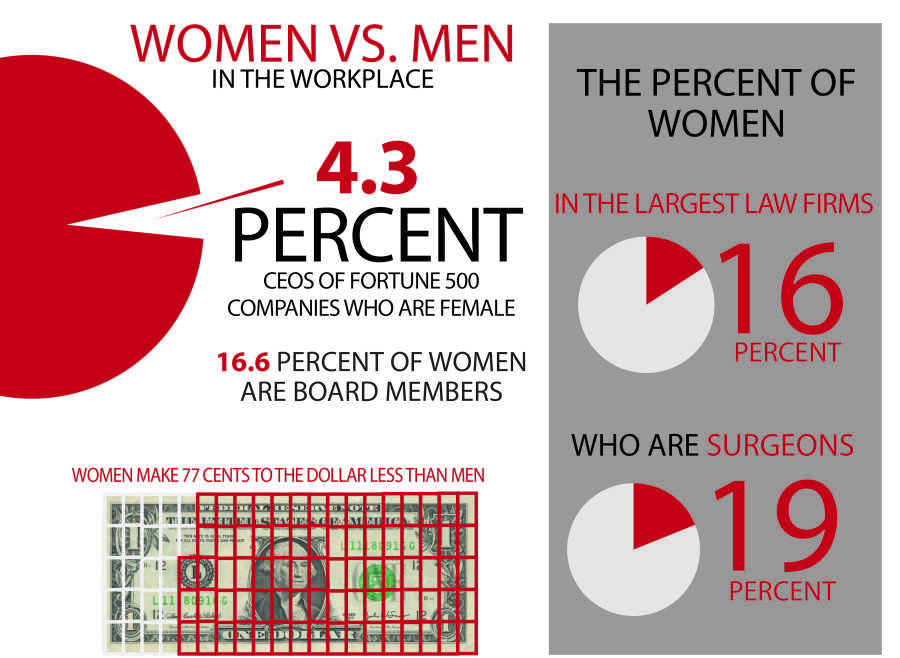Lecture discusses social issues, wage gap upon women in the work force
May 14, 2014
The EWU Women’s and Gender Studies Program hosted a lecture on May 6 at Eastern elaborating on women’s choices not to climb the job ladder in the business world, especially within Fortune 500 companies and science careers.
Vickie Shields, Ph.D. and dean of the college of social and behavioral sciences and social work at EWU, was inspired to do the lecture after reading an article published in ‘The Chronicle’ by Debora Spar, author of “Wonder Women: Sex, Power, and the Quest for Perfection.”
“I first became aware of this book in this terrain through a really excellent article by Debora Spar in The Chronicle and ‘the Superwoman Myth,’ so that really spurred me on to want to do this presentation, actually,” said Shields.
Around the time Spar’s book hit the shelves and her news story made waves, Chief Operating Officer of Facebook, Inc., Sheryl Sandberg, wrote the book, “Lean In: Women, Work and the Will to Lead.” Shields heard about the national bestseller and became intrigued by the subject matter.
According to Shields, she had a lot of assumptions and perceived notions going into her research on women in the business world in correlation to these two books. She felt the authors were portraying these feminist ideas as new and up-and-coming issues. Shields said, however, the topics raised in the books have been discussed among the gender-social spectrum for decades.
“I had a lot of my own biases and stereotypes going into this research. These two books … are really worth a read and they’re much more nuance than that first reaction,” Shields said to the audience.
Shields shared statistics present in both books: female CEO’s of Fortune 500 companies is 4.3 percent, with 16.6 percent of women being board members of those companies. The largest law firms’ female partners account for 16 percent, with women surgeon’s totaling to 19 percent in the U.S. The wage gap for women is 77 cents to the dollar compared to men, specifically white women.
“These are some of the numbers where [the author’s] start trying to unpack why that is and especially why those numbers have been kind of stuck on the dial for at least 10 years, maybe more. … Where are we stuck? Why are women stuck?” Shields said.
According to Shields, there is an ambition gap among middle-class women in the US that Sandberg discusses. This idea personifies women not “leaning in” for opportunities due to small decisions they make throughout their careers.
“They’re actually leaning back from opportunities to go further in their careers. In this ambition gap, [Sandberg] talks about that woman make a lot of small choices along the way that make large setbacks for them,” said Shields.
Eastern’s Advance grant process, according to Shields, is competitive for universities to find climates that would keep women from advancing in the sciences. Many science programs have start-up packages scientists can ask for, such as lab equipment.
“That point for a science person is really huge. It was very stark in the past that women scientists were getting way behind way fast, such as they didn’t want to negotiate or they didn’t negotiate well,” said Shields.
Shields said that in the book, “Lean In,” Sandberg had an epiphany when she was eight-months pregnant: women should have front parking spots at all major businesses. Shields then raised the question: Why does that almost give Sandberg more credibility?
Dr. Jessica Willis of the EWU Women’s and Gender Studies Program said that the authors are so credible because they are non-threatening and they fit into the “distinct status quo.”
“We’re talking still about white women who have made it and were talking about upper class women who have had extraordinary educational opportunities and they’re saying things that are not threatening to the culture,” said Willis. “I think one of the things they do that as well is they make [themselves] credible by discrediting feminism. … Young folks, women and men will say ‘I’m not a feminist, but I believe in equality.’ So they become more credible by making themselves seen as being acceptable to everyone.”
Fira Hedlund, a senior at Eastern and a teacher’s assistant for Willis’ sex and gender class, attended the lecture. Jhe thought that the lecture, overall, was very intelligent and that Shields was knowledgeable on the subject matter.
“The only thing that grated on me was when she kept on referring to Sandberg as ‘Shepherd,’” said Hedlund.
During the lecture, Shields had referred to Sheryl Sandberg as Sheryl Shepherd and Debora Spar as Debora Skar. Shields realized the name errors toward the end of her lecture.
“How in the world, I had been living with this stuff and then I’m like ‘Shephard’ and ‘Spar,’ no, I said ‘Skar’ and ‘Shepherd’ and it’s Sandberg and Spar,” Shields said.
“When you have something as basic as a name messed up, even if you’re intelligent and wonderful and highly informative, screwing up a name makes you come off as less knowledgeable,” Hedlund said.
[polldaddy poll=8048528]







![Simmons said the biggest reasons for her success this year were “God, hard work, and trusting [her] coach and what she has planned.”](https://theeasterner.org/wp-content/uploads/2024/05/image1-1-1200x800.jpg)


![Simmons said the biggest reasons for her success this year were “God, hard work, and trusting [her] coach and what she has planned.”](https://theeasterner.org/wp-content/uploads/2024/05/image1-1-600x400.jpg)






